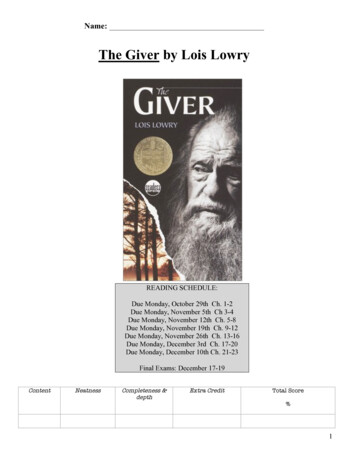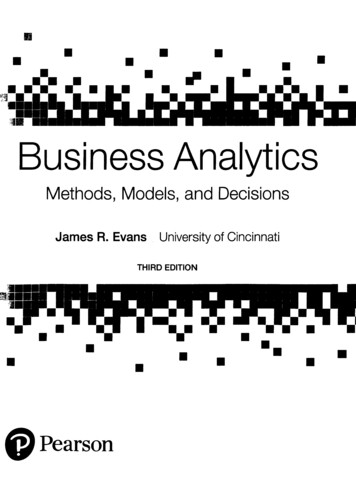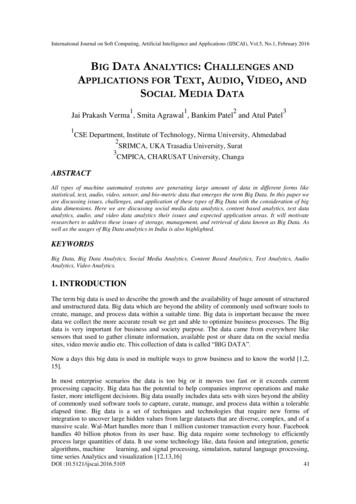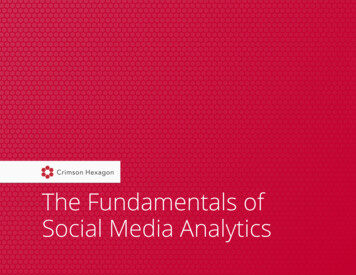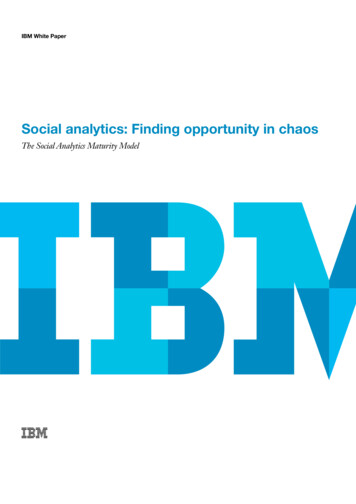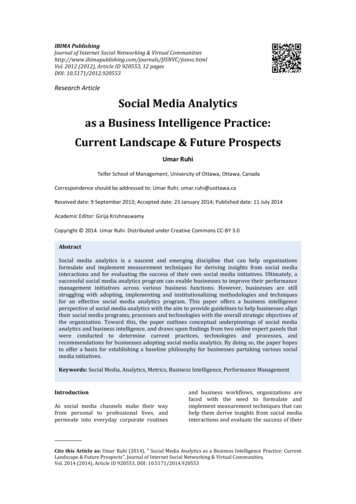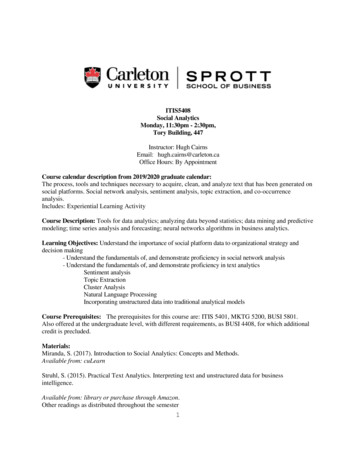
Transcription
ITIS5408Social AnalyticsMonday, 11:30pm - 2:30pm,Tory Building, 447Instructor: Hugh CairnsEmail: hugh.cairns@carleton.caOffice Hours: By AppointmentCourse calendar description from 2019/2020 graduate calendar:The process, tools and techniques necessary to acquire, clean, and analyze text that has been generated onsocial platforms. Social network analysis, sentiment analysis, topic extraction, and co-occurrenceanalysis.Includes: Experiential Learning ActivityCourse Description: Tools for data analytics; analyzing data beyond statistics; data mining and predictivemodeling; time series analysis and forecasting; neural networks algorithms in business analytics.Learning Objectives: Understand the importance of social platform data to organizational strategy anddecision making- Understand the fundamentals of, and demonstrate proficiency in social network analysis- Understand the fundamentals of, and demonstrate proficiency in text analyticsSentiment analysisTopic ExtractionCluster AnalysisNatural Language ProcessingIncorporating unstructured data into traditional analytical modelsCourse Prerequisites: The prerequisites for this course are: ITIS 5401, MKTG 5200, BUSI 5801.Also offered at the undergraduate level, with different requirements, as BUSI 4408, for which additionalcredit is precluded.Materials:Miranda, S. (2017). Introduction to Social Analytics: Concepts and Methods.Available from: cuLearnStruhl, S. (2015). Practical Text Analytics. Interpreting text and unstructured data for businessintelligence.Available from: library or purchase through Amazon.Other readings as distributed throughout the semester1
Drop Course Policy:The deadline for academic withdrawal is the last day of classes (each term).Grading Scheme:2 Hands on Assignments4 In class ProjectsFinal Project30%20%50%TOTAL100%Course Software: SAS Studio and the SAS Viya platform will be used to complete assignments. It ishighly recommended that students familiarize themselves with SAS as much as possible before theassignments are distributed. SAS offers a free e training called Prog 1 that provides an overview of theSAS interfaces and introduces data manipulation techniques that will be used in this course. The course canbe located at: http://support.sas.com/training/tutorial at the bottom of the page. The Prog 1 course is usually3 days in duration so please give yourself enough time to complete. For assignments, the course will usethe SAS environment provided by SAS online for Academics. Instructions on how to access this portal willbe given on the CULearn site.Assignments: Students will be given two assignments for completion before the beginning of class on theassigned date. Assignments must be submitted electronically before the start of the class on the datesindicated on the course outline. Failure to submit the assignments on time may result in the loss of marks.Students may work in groups to complete the assignments; however, each student must prepare and submittheir own assignment.In Class Projects: A Business Case will be assigned in week 3. The business case has two components; a15-minute presentation and a 6-8-page report. The topic of the business case must be submitted to me inWeek 8. The presentations will be delivered to the class in the second half of class beginning in week 11.The final report is due at the end of week 12. All students must submit their own work and are subject tothe academic integrity policies found at the bottom of this outline.Mid Term Exam: There will be no midterm exam.Final exam date: There will be no final examPreparation and participation: Students are expected to have read the readings assigned. This will help thestudents understand the context of the analytical method(s) that will be covered in class.Missed assignments and deferred examination: All assignments not submitted by the start of class(8:30am) will receive a grade of zero.Deferred Final Examination:Students unable to write a final examination because of illness or other circumstances beyond theircontrol must contact the instructor and the MBA office in writing to request a deferred exam. Permissionmay be granted when the absence is supported by a medical certificate and or appropriate document/s tosupport the reason for the deferral.2
Course Schedule:Week1DateJan 6 2020Topic/Agenda Pre-class Preparation Lecture Notes Introduction and review of course outlines, classnorms and technical environmentIntroduction to Social AnalyticsSteps in Analytic ProjectOverview of Data2Jan 13 2020 Data Manipulation OverviewIntroduction to SAS StudioData Integration TechniquesProcedures relevant when working with text. Lecture Notes3Jan 20 2020 Text Analytics ISAS Visual Text Analytics (VTA)Corpus ReviewText FilterText Parsing Lecture NotesIn class SAS Exercises 1.1 & 1.24Jan 27 2020 Text Analytics IISAS Visual Text Analytics (VTA)Concept Definition/ExtractionIn-Class Assignment Lecture NotesIn class SAS Exercises 2.1, 2.2, 2.3 5Feb 3 2020 Text Analytics IICategorizationTaxonomy CreationScoring New DataMeet the Client Final PresentationTake home Assignment 1 distributed Lecture Notes6Feb 10 2020 NLP OverviewSAS Visual Text Analytics (VTA)Custom ConceptsIntroduction to LITIIn-Class Assignment Lecture Notes4.37Feb 17 2020No ClassesNAFeb 24 2020No ClassesNAMar 2 2020 SNA IOverview to Social Network AnalysisTheoretical OriginsTake home Assignment 1 submitted3 Lecture Notes
8Mar 9 2020 SNA IIVisualization of NetworksIn class assignment Lecture Notes9Mar 16 2020 SNA IIIProbabilistic MethodsDescriptive Statistics for Social NetworksTake home Assignment 2 distributed Lecture Notes10Mar 23 2020 SNA IIILevels of Analysis for SNAIn Class Assignment Lecture Notes11Mar 30 2020Putting it all together.SNA Text Analytics Lecture Notes12Apr 6 2020 Client PresentationsTake home Assignment 2 submitted NAPolicy on Mobile DevicesThe use of mobile devices IS NOT PERMITTED in this class. It is disruptive to the instructor and classmembers. If you carry such a device to class, please make sure it is turned off. If an emergency situationrequires you to keep it turned on, please discuss this with your instructor prior to class.ADDITIONAL INFORMATIONCourse Sharing WebsitesMaterials created for this course (including presentations and posted notes, labs, case studies, assignmentsand exams) remain the intellectual property of the author(s). They are intended for personal use and maynot be reproduced or redistributed without prior written consent of the author(s).Required calculator in BUSI course examinationsIf you are purchasing a calculator, we recommend any one of the following options: Texas InstrumentsBA II Plus (including Pro Model), Hewlett Packard HP 12C (including Platinum model), StaplesFinancial Calculator, Sharp EL-738C & Hewlett Packard HP 10bIIGroup workThe Sprott School of Business encourages group assignments in the school for several reasons. Theyprovide you with opportunities to develop and enhance interpersonal, communication, leadership,follower-ship and other group skills. Group assignments are also good for learning integrative skills forputting together a complex task. Your professor may assign one or more group tasks/assignments/projectsin this course. Before embarking on a specific problem as a group, it is your responsibility to ensure thatthe problem is meant to be a group assignment and not an individual one.In accordance with the Carleton University Undergraduate Calendar (p 34), the letter grades assigned inthis course will have the following percentage equivalents:4
A 90-100A 85-89A - 80-84F Below 50B 77-79B 73-76B - 70-72C 67-69C 63-66C - 60-62D 57-59D 53-56D - 50-52Grades entered by Registrar:WDN Withdrawn from the courseDEF DeferredAcademic RegulationsUniversity rules regarding registration, withdrawal, appealing marks, and most anything else you mightneed to know can be found on the university’s website, ions/academicregulationsoftheuniversity/Requests for Academic AccommodationYou may need special arrangements to meet your academic obligations during the term. For anaccommodation request, the processes are as follows:Pregnancy obligationPlease contact your instructor with any requests for academic accommodation during the first two weeksof class, or as soon as possible after the need for accommodation is known to exist. For more details, visitthe Equity Services website: ent-Guide-to-AcademicAccommodation.pdfReligious obligationPlease contact your instructor with any requests for academic accommodation during the first two weeksof class, or as soon as possible after the need for accommodation is known to exist. For more details, visitthe Equity Services website: ent-Guide-to-AcademicAccommodation.pdfAcademic Accommodations for Students with DisabilitiesIf you have a documented disability requiring academic accommodations in this course, please contact thePaul Menton Centre for Students with Disabilities (PMC) at 613-520-6608 or pmc@carleton.ca for aformal evaluation or contact your PMC coordinator to send your instructor your Letter ofAccommodation at the beginning of the term. You must also contact the PMC no later than two weeksbefore the first in-class scheduled test or exam requiring accommodation (if applicable). After requestingaccommodation from PMC, meet with your instructor as soon as possible to ensure accommodationarrangements are made. carleton.ca/pmcSurvivors of Sexual ViolenceAs a community, Carleton University is committed to maintaining a positive learning, working and livingenvironment where sexual violence will not be tolerated, and is survivors are supported through academicaccommodations as per Carleton's Sexual Violence Policy. For more information about the servicesavailable at the university and to obtain information about sexual violence and/or support, Accommodation for Student ActivitiesCarleton University recognizes the substantial benefits, both to the individual student and for theuniversity, that result from a student participating in activities beyond the classroom experience.5
Reasonable accommodation must be provided tostudents who compete or perform at the national orinternational level. Please contact your instructor with any requests for academic accommodation duringthe first two weeks of class, or as soon as possible after the need for accommodation is known to s/Accommodation-for-Student-Activities-1.pdfFor more information on academic accommodation, please contact the departmental administrator orvisit: students.carleton.ca/course-outlineAcademic IntegrityViolations of academic integrity are a serious academic offence. Violations of academic integrity –presenting another’s ideas, arguments, words or images as your own, using unauthorized material,misrepresentation, fabricating or misrepresenting research data, unauthorized co-operation orcollaboration or completing work for another student – weaken the quality of the degree and will not betolerated. Penalties may include; a grade of Failure on the submitted work and/or course; academicprobation; a refusal of permission to continue or to register in a specific degree program; suspension fromfull-time studies; suspension from all studies at Carleton; expulsion from Carleton, amongst others.Students are expected to familiarize themselves with and follow the Carleton University StudentAcademic Integrity Policy which is available, along with resources for compliance y/Centre for Student Academic SupportThe Centre for Student Academic Support (CSAS) is a centralized collection of learning support servicesdesigned to help students achieve their goals and improve their learning both inside and outside theclassroom. CSAS offers academic assistance with course content, academic writing and skillsdevelopment. Visit CSAS on the 4th floor of MacOdrum Library or online at: carleton.ca/csasImportant Information:- Students must always retain a hard copy of all work that is submitted.- All final grades are subject to the Dean’s approval.- For us to respond to your emails, we need to see your full name, CU ID, and the email must be writtenfrom your valid CARLETON address. Therefore, in order to respond to your inquiries, please send allemail from your Carleton CMail account. If you do not have or have yet to activate this account, you maywish to do so by visiting /Important dates and ates-deadlines-policies/6
2 Jan 13 2020 Data Manipulation Overview Introduction to SAS Studio Data Integration Techniques Procedures relevant when working with text. Lecture Notes 3 Jan 20 2020 Text Analytics I SAS Visual Text Analytics (VTA) Corpus Review Text Filter Text Parsing Lecture Notes In class SAS Exercises 1.1 & 1.2
